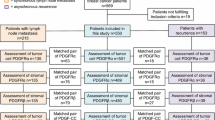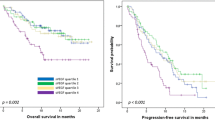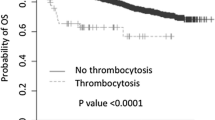Abstract
Background. Many recent studies have found that several angiogenic factors play an important role in primary and metastatic tumor growth. Platelet-derived growth factor (PDGF) is known to induce angiogenesis. In this study, we investigated whether tumor PDGF can reliably predict metastatic potential and survival benefit in patients with breast cancer.
Methods. Histoimmunological analysis with two isoforms of PDGF, PDGF-AA and PDGF-BB, was performed on formalin-fixed, paraffin-embedded tissue. This analysis was performed in 83 patients with breast cancer; 30 with hematogenous recurrence, 13 with locoregional recurrence, and 40 surviving without recurrence.
Results. Of the 30 patients with hematogenous recurrence, 13 (43.3%) showed PDGF-AA expression [PDGF-AA(+) group] and the remaining 17 (56.7%) showed no expres-sion of tumor PDGF-AA [PDGF-AA(−) group]. In the locoregional recurrence group, 1 patient (7.7%) showed PDGF-AA expression, and 2 of the 40 patients surviving without recurrence (5%) showed PDGF-AA expression in the primary tumor tissue. In contrast, PDGF-BB expression was observed in all 43 patients with recurrence and in 37 of the 40 patients surviving without recurrence. The PDGF-AA(+) and locoregional recurrence groups had almost the same period to recurrence after surgery (25.2 ± 18.5 months and 24.0 ± 11.3 months, respectively), whereas this period in the PDGF-AA(−) group was significantly longer (P < 0.0489 and P < 0.0400, respectively) than that of these other two groups. The 2-, 5-, and 8-year survival rates for the PDGF-AA(−) group were 70.6%, 47.1%, and 35.3%, respectively, whereas those for the PDGF-AA(+) group were 61.5%, 23.1%, and 15.4%, respectively; those for the locoregional recurrence group were 76.9%, 23.1%, and 7.7%, respectively. The survival rate for the PDGF-AA(−) group tended to be better (P = 0.0907) than that for the PDGF-AA(+) group, and showed no difference (P = 0.148) from that of the locoregional recurrence group.
Conclusion. The data on PDGF-BB expression indicate that PDGF-BB is largely concerned with primary tumor growth and is not related to hematogenous metastasis. In contrast, PDGF-AA expression seems to be linked with hematogenous metastasis.
Similar content being viewed by others
Author information
Authors and Affiliations
Additional information
Received: December 1, 1999 / Accepted: August 25, 2000
About this article
Cite this article
Fujimoto, S., Takahashi, M., Igarashi, N. et al. Prognostic impact of platelet-derived growth factor in breast carcinoma patients with hematogenous metastasis. Int J Clin Oncol 5, 361–366 (2000). https://doi.org/10.1007/PL00012064
Issue Date:
DOI: https://doi.org/10.1007/PL00012064




